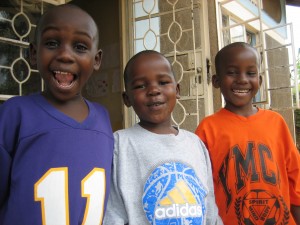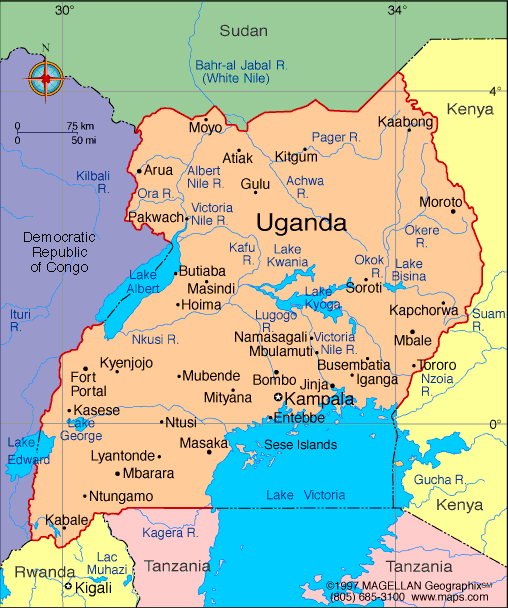Last Thursday I was reading a book
that the embassy gave called “Uganda Society Observed” out on the porch of my
house. I was in the middle of an unfortunately true explanation of the
submissive role women take in the Ugandan culture. The author was detailing how
most Ugandan men engage in
semi-polygamous relationships. This section especially resonated with me
because it reminded my of an ad that caught my eye in the city. The ad read
something along the lines of “Not sure where he’s been? Get your HIV test
today.” It was a huge ad, something, billboard sized. If that is effective
advertising that most women can relate to, Uganda has a long was to come in
women’s rights. But that is a discussion for another time. I don’t know enough
yet about the culture to draw any conclusions.
In the
middle of this semi-deep thinking, I noticed a young boy who was peeking his
head around the corner of the house. I had noticed him many times before, and every
time I look at him, he just runs away. This time, I followed and called after
him. “Hey man, you know I don’t bite.” He was really shy, but I started talking
to him. His older brother came down to say hi too. Polasco, his brother, was
24. Polasco and I started talking, and then he asked if I wanted to go on a
walk to see some of the city. “30 minute
walk,” he said. If you like sports, we will go to a sports field. I agreed.
After all, he seemed like a nice guy.
We started
walking up the hill. Past new Mulago, and into old Mulago hospital. Old Mulago
and New Mulago are different sites of the same organization that house different
specialties. I had never been to old Mulago, and I could easily tell where the
terms came from. We emerged from a narrow alley to a much more pedestrian scene
compared to the city. No cars, very few bikes, and a lot of smaller shack
shops. Just as Polasco promised, there was a soccer field. A bit different from
the states, this one had no grass whatsoever. Polasco, was also quick to show
me the basketball hoop. Oh, he is pointing to that pole in the ground with a
ring at the top. No net. No backboard. No concrete court. There were dozens of
children and young adults playing various games on the fields. It looked like a
fun time.
We kept
walking through the field and he took me to his friends shop. A shack with a
computer in it that was blasting music. He said his friend made CDs, and I
could get a custom mix if I wanted. For 3000 Ugs ($1.20), how could I say no?
He instructed me to sit next to his friend in the hut and give a thumbs up or
down as he played songs. I asked for all Ugandan artists. The CD turned out
great.
We kept
walking down the street, this time into a hilly and grassy area that was much
more residential. Polasco said that he was taking me to where he was building a
house. It was here when I first started hearing it…”Muzungu! Muzungu!” I was
previously wondering if Uganda children didn’t know the familiar term for a
white person. Turns out you just have to get a little out of the city and into
the residential area, where less Muzungus hang out. Polasco showed me his house
under construction with great pride. He made clear which room was the soon to
be living room and which room was the bedroom. He explained that it looked like
sticks and mud right now, but after some work he would finishing mudding the
walls, and then he could seal it with concrete, run electricity, and move in!
His neighbors were great, too. Three generations of women working together to
prepare dinner outside. They joked and said that they kick down the walls when
Polasco leaves so that he can’t move in anytime soon. They also said, however,
that the both of us were welcome for dinner anytime.
It was now
6pm and the sun would be going down soon. Polasco was very conscious of the
time, and ensured we headed back soon. We walked and talked. He even grabbed my
hand, and we walked hand in hand for a while. This is a very sincere gesture of
friendship in most East African cultures. Polasco already considered me a good
friend. This is great, cause I can always use good friends in foreign places.









